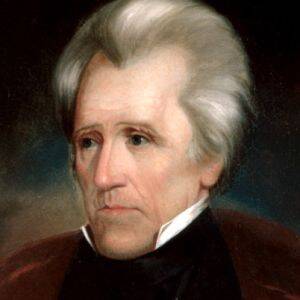New York magazine’s Jonathan Chait thinks it’s crazy that Andrew Jackson, white supremacist and hater of a strong central government, is still considered a founder of the modern Democratic Party: “The premise that there is a philosophical tradition connecting Jackson to such figures as Franklin Roosevelt and Lyndon Johnson—the cherished foundation of generations of Democratic Party thought—should be seen for what it is: a myth.”
He concludes, “Modern Democrats increasingly look upon Jackson with revulsion, and if he could return to see what his party has become, he would reciprocate.”
Chait is correct, and it’s surreal that Barack Obama has made speeches at “Jefferson Jackson” dinners in Iowa, both as candidate and as president. The first African-American chief executive, elected thanks to huge majorities in large cities, has had to pretend that he’s the philosophical successor to Thomas Jefferson, who thought that America’s greatness depended on remaining an agrarian society, and Jackson, whose opposition to not only a national bank but also a federal highway system made him more of a forerunner to today’s Tea Party movement.
One of the most striking quotes in Chait’s piece is from a 2008 piece by historian Sean Wilentz, who criticized then-candidate Obama for “usurping the historic Democratic Party, dating back to the age of Andrew Jackson, by rejecting its historic electoral core: white workers and rural dwellers in the Middle Atlantic and border states. … Out with the Democratic Party of Jefferson, Jackson, F.D.R., Truman, Kennedy and Johnson, and in with the bright, shiny party of Obama.”
Wait. Kennedy?
John F. Kennedy, who epitomized his party’s shift from a Southern rural to a Northeastern urban base, was a Jacksonian Democrat? Was Wilentz arguing that Old Hickory would have been pleased to claim the first Catholic president and the founder of the Peace Corps as a successor?
It was Kennedy, not Obama, who first broke the Jackson Coalition.
Consider the political geography. Kennedy and Obama are the only Democrats since the formation of the two-party system to win election without carrying Kentucky or Jackson’s political base of Tennessee. In 1960, Kennedy lost several other states that had been loyal to FDR and Truman (including Oklahoma and Virginia) and barely carried the traditional Democratic strongholds of Missouri and North Carolina. His poor performance in southern Ohio kept him from being competitive in that state, despite his strength in Cleveland and other cities. Kennedy held on to West Virginia, but that was probably due to the personal attention he gave the state during that year’s presidential primaries and the un-South-like power of labor unions there.
Kennedy suffered the same backlash among “white workers and rural dwellers” (almost all of them Protestant) along the Appalachians and in the interior South that Obama would experience 48 years later.
But Kennedy’s thin Electoral College win and disputed popular-vote victory didn’t reset the Democratic Party. It quickly became non-reproducible, as population tends shifted political power from the Northeast to the South and West. For a while, it did seem that only rural Southerners (i.e., Jimmy Carter and Bill Clinton) could win the White House for the Democrats. It was only after the Democrats secured a second base on the West Coast, to go along with their Northeastern and Great Lakes states, that someone like Obama (and his “champions of a new party coalition,” as Wilentz sarcastically described them in 2008) could win without Andrew Jackson strongholds.
Now it seems ludicrous for Hillary Clinton or any Democratic nominee to build a general election campaign around winning Kentucky or Tennessee, two states where Obama couldn’t crack 40 percent even when winning re-election.
Still, at least one Democratic candidate for president is still championing Andrew Jackson. Former Virginia Sen. James Webb—who announced his candidacy last week in a low-key fashion, with little media notice because of the holiday weekend—is appealing to rural white voters by mixing a dovish foreign policy, which could be interpreted as isolationism, with cultural conservatism. (He was hesitant to condemn the display of the Confederate flag, even following the murder of nine African-Americans in a South Carolina church by a white supremacist.)
In a January interview with NPR, Webb echoed the views of Sean Wilentz noted above, saying, “The Democratic Party could do very well by returning to its Franklin Roosevelt, Harry Truman, Andrew Jackson roots, where the focus of the party was making sure that all people who lack a voice in the corridors of power could have one through their elected representatives.”
Speaking of “Jacksonian democracy” and its roots among the Scots-Irish in the Appalachians, he said, “Andrew Jackson was the first American president who was not of the English aristocratic descent. He established the principle that you measure the health of your society at the base, you know, not at the apex. He enabled that political philosophy to sort of become the American philosophy, the way that we have looked at political issues since.”
But leaders of the Republican Party would certainly argue that they want to represent “all people who lack a voice in the corridors of power.” It’s just that most Republicans believe the way to do this is by limiting the scope of government, and in particular the national government. (Kentucky Sen. Rand Paul personifies this line of thinking.) It’s hard to imagine that Andrew Jackson would prefer the “big government” solutions to poverty and inequality that have been put forth by Democratic leaders from FDR to JFK to Obama. He’d probably repeat the line made famous by Ronald Reagan: “I didn’t leave the Democratic Party. The party left me.”








